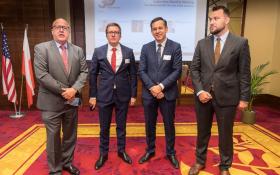- 10 września 2020
- Category: Bez kategorii

After an abnormal summer, AmCham’s Monthly Meetings have returned with an exceptional first hybrid session. The September session was held at the Marriott Hotel in Warsaw both live and through the WebEx system. All of our member companies were able to participate in this meeting despite the pandemic restrictions. The September meeting was dedicated to the impact of COVID-19 on the Polish economy, one of the hottest topics in daily debates. Our panelists were discussing Polish GDP contractions in 2020 and the current challenges for our economy to rebound to its former pre-pandemic state with potential growth shortly.
Mr. Piotr Arak, Director of the Polish Economic Institute said that The Polish economy has relatively handled the challenge of the pandemic rather well regarding the decline in activity triggered by the epidemic restrictions. He confirmed that previous predictions announced by PIE were in the negative with a GDP drop in Q2 by 8.2% year-over-year, and it was close to experts’ predictions. However, taking into account the latest results of the research on consumption expenditure conducted by PIE, Mr. Arak drew a very optimistic picture of the next few months.
Monthly data indicate that the rebound in Q3’2020 is much faster than the economic forecast, both in Poland and in other EU countries. Currently, according to PIE, the Polish economy will shrink by 3.2% y-o-y and this result is better than the previous forecasts, which assumed a 4.2% decline. Although, the outlook for Q4 is still uncertain – the PIE currently forecasts that the rebound in consumption will fade away, although in June and July there were better results in the production and sales of durable goods (i.e. electronics and household appliances), which at that time had a double-digit growth dynamic due to the seasonal attitude of customers. The service sector, especially in catering, recreation, and consumer services sectors, will continue to be a burden.
During the discussion, Mr. Sławomir Dudek, the Chief Economist at the Employers of Poland, noted that the unprecedented demand shock, which hit companies in the early spring in many industries, left its mark for a long time. Employers expect that the coming months will be a test for the entire economy, its strength to rebuild a potential of growth, as well as resistance to uncertainty about the second wave of the pandemic. Unfortunately, there is a risk that the unemployment rate will increase again with the end of financial support by public funds „We are facing a fragile revival of the economy”, said Mr. Dudek.
From the perspective of the financial markets, Mr. Piotr Kalisz, Chief Economist at Citi Handlowy, highlighted a few important issues. First of all, he argued that public funds have helped many companies maintain their liquidity, but still many companies feel uncertainty, which greatly constrains their market expansion strategies.
The panelists also drew our attention to foreign economic relations. It is worth noting that the Polish economy has recently been strengthened by exports, which increased GDP in the first half of 2020. This was the result of a smaller scale in restrictions in Poland’s main trading partners and a rapid recovery from the crisis by German manufacturers who were also contractors for Polish suppliers of components. This perhaps allowed them to avoid more severe losses in the Polish industry. At the same time, the volume of foreign orders is growing faster than domestic orders, which bodes well for the remainder of Q3’2020. Very favorable in this context is the relatively higher diversification of exports than in other countries in our region, i.e. the Czech Republic or Slovakia, whose export recovery is much slower after a strong decline in the demand in the automotive industry.
Our guests agreed that the coronavirus has accelerated critical trends in many businesses, such as digitalization and automation. Thus, it resulted in fast progress in business culture and the adaptation to the online work making the labor force to adjust to a new normal. From that perspective, the Polish job market stays competitive for foreign investors which find the lower costs, suitable job market qualifications, willingness to acquire new skills, and digital readiness shape the country’s adaptation to industry 4.0. Nonetheless, long term competitiveness in Poland requires some attention from policymakers, because pre-pandemic barriers to growth may regain importance. These include limited labor supply resulting from an aging population. To prevent this, migration policy needs are emphasized once again. Economic policy will create favorable business conditions for investors and attract new foreign capital to our country.